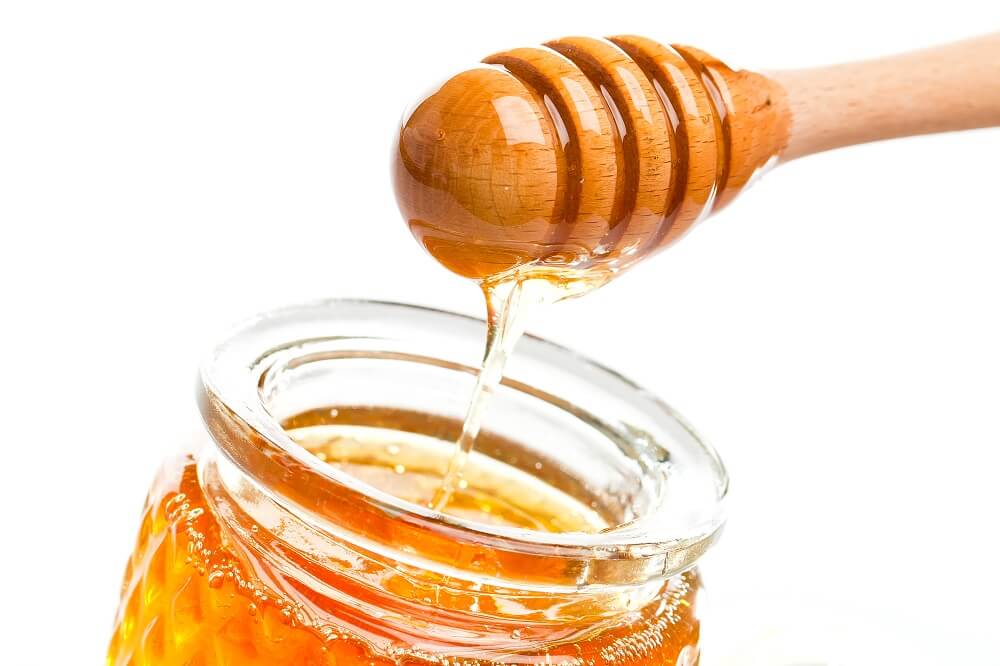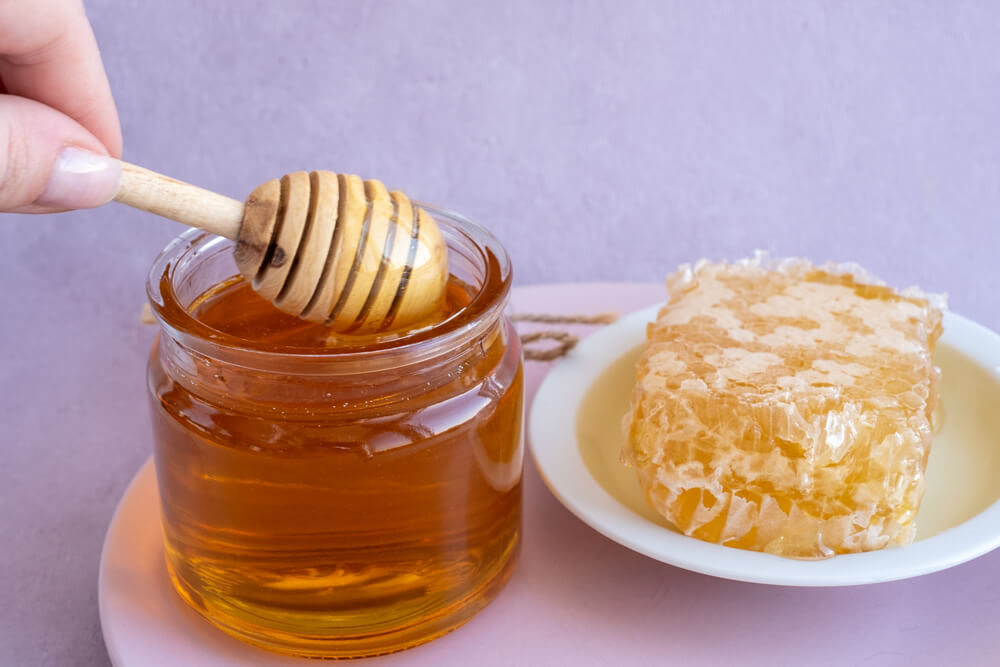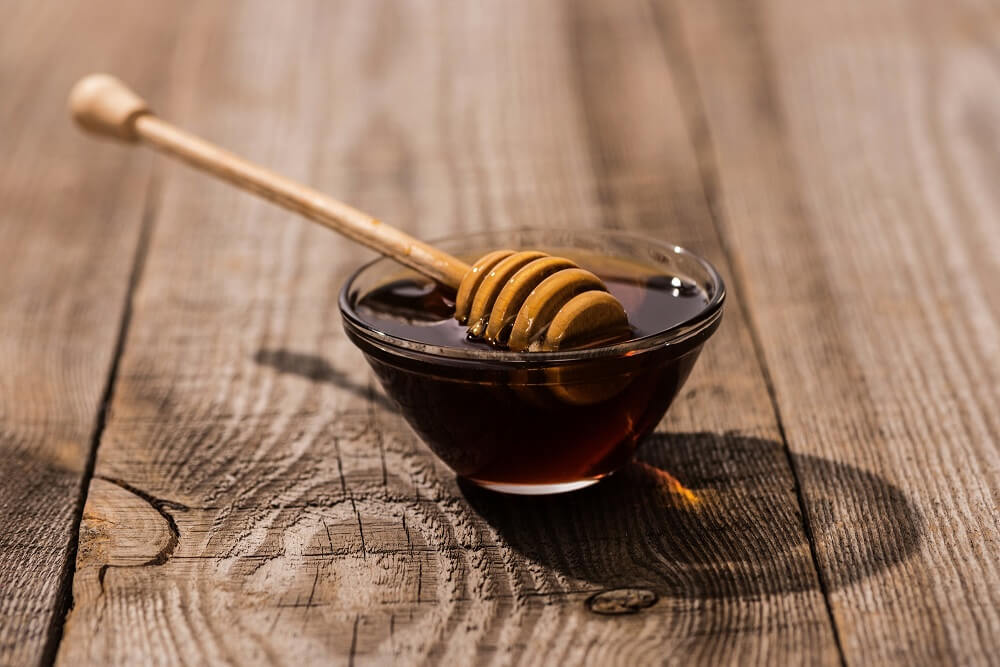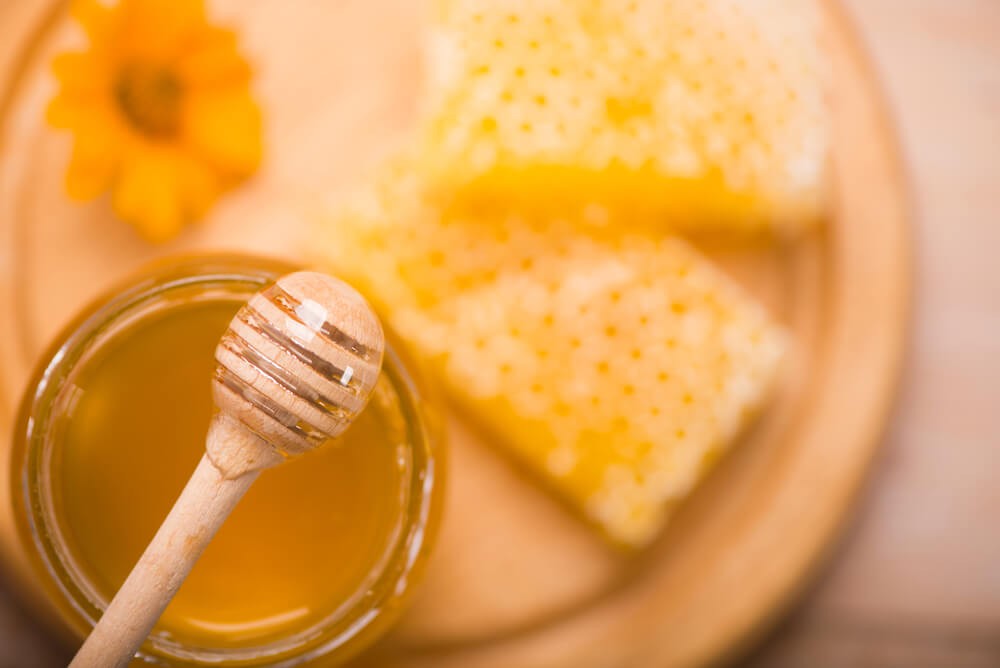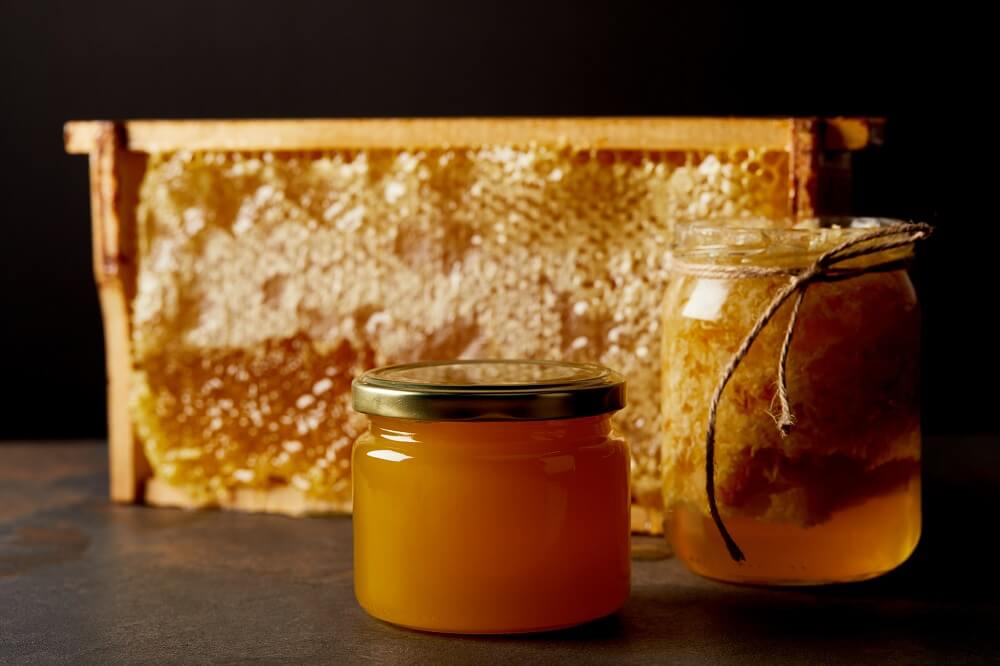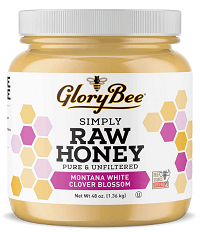What is Clover Honey?
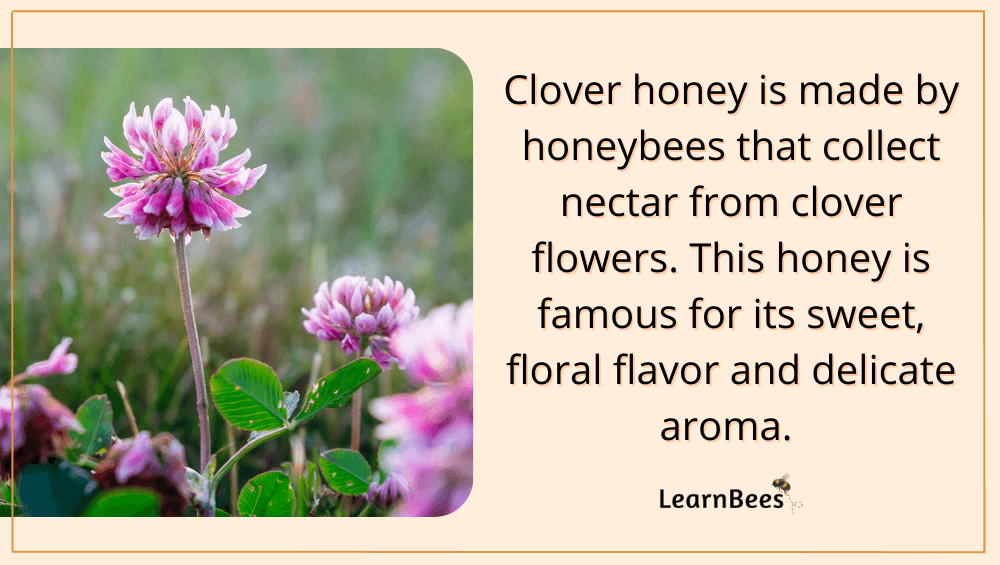
Clover honey is made by honeybees that collect nectar from clover flowers. Clover flowers bloom through the spring and summer. They come in beautiful shades of white, pink, red, and yellow.
But why is clover honey so popular?
Two reasons.
For one, honeybees are attracted to the small, fragrant clover blossoms. As a result, this type of honey is produced in large quantities by honeybees.
Secondly, clover honey is famous for its sweet, floral flavor and delicate aroma. It has a subtle sweetness that pairs well with tea, coffee, or buttered toast.
More importantly:
Raw clover honey contains beneficial antioxidants and enzymes that you can’t get from processed honey. Raw clover honey tends to have a purer taste and a thicker consistency than processed honey.
Clover Honey Nutrition
One tablespoon of this honey contains:
- Calories: 60 calories
- Protein: 0 grams
- Fat: 0 grams
- Carbs: 17 grams
- Sugars: 16 grams
Clover Honey Benefits
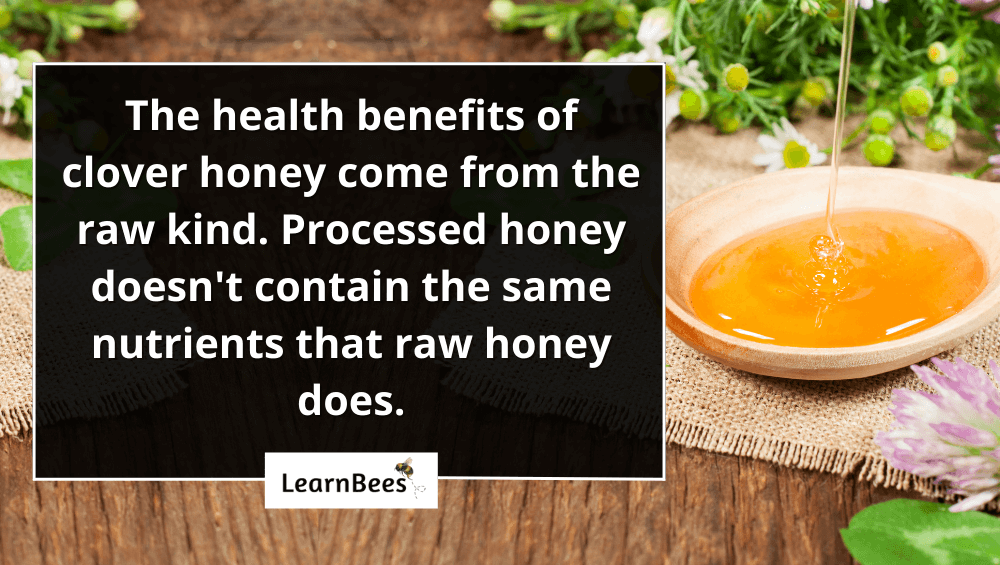
You might be asking:
Is clover honey good for you?
The answer is yes.
Raw clover honey contains many health benefits. It’s rich in antioxidants and enzymes, while also being antibacterial, anti-inflammatory, and antiviral. Clover honey is a popular home remedy for many things, including treating sore throats and coughs.
With that in mind, the health benefits of clover honey come from the raw version.
In contrast, processed honey loses its health benefits during the pasteurization process. It can get overheated to the point where it’s stripped of its enzymes, antioxidants, and other nutrients.
So what can you do?
Buy clover honey with labels that say it’s “raw” and “unfiltered.”
Now the question becomes:
What are the benefits of pure clover honey?
Let’s discuss a few.
Benefit 1: Clover Honey Is Antibacterial and Antiviral

The antibacterial properties of honey have been widely studied in clinical settings.
For example, it’s an effective antibacterial dressing for burns and scratches since bacteria can’t develop resistance to honey.(1)
In a 3-month study, clover honey was used as a topical treatment for 30 different diabetic wounds. 43% of the wounds healed completely, and another 43% were significantly reduced in bacteria count and size.(2)
Clover honey has been used to treat skin cells infected with the chickenpox virus. Researchers ran a test-tube study that showed the virus significantly decreased with applying a 5% clover honey solution.(3)
Honey has been found to improve seborrheic dermatitis, a skin condition resulting in redness and scaly patches.(4)
Benefit 2: Clover Honey Can Soothe Sore Throats

Honey is more effective than some over-the-counter cough medicines, thanks to its anti-inflammatory properties.
One study found that honey relieves coughs better than OTC medications with dextromethorphan (DM), a cough suppressant.(5)
A review of studies suggests that honey could be superior at treating upper respiratory tract infections than other treatments.(6)
Benefit 3: Clover Honey is Rich in Antioxidants

Clover honey is chock-full of antioxidants such as phenolic acids, which can strengthen your central nervous system.(7)
Antioxidants are substances that help protect cells from being damaged by free radicals. Free radicals can damage your body and lead to health problems like coronary heart disease, cataracts, and cancer.(8, 9)
In a mice study, clover honey reversed liver damage caused by free radicals.(10)
The flavanols in clover honey can also improve overall heart and lung health.(11)
Benefit 4: Clover Honey Can Help Lower Blood Pressure and Cholesterol Levels

According to one review, honey can help lower blood pressure, improve blood fat levels, and prevent the death of healthy cells. As a result, this can lead to better heart health.(12)
Raw honey typically contains propolis, a resin-like mixture made by honeybees. Propolis may improve cholesterol and triglyceride levels.(13)
Another study of 4,500 people showed that a moderate intake of honey could lead to a lower risk of high blood pressure among women.(14)
Clover Honey Side Effects
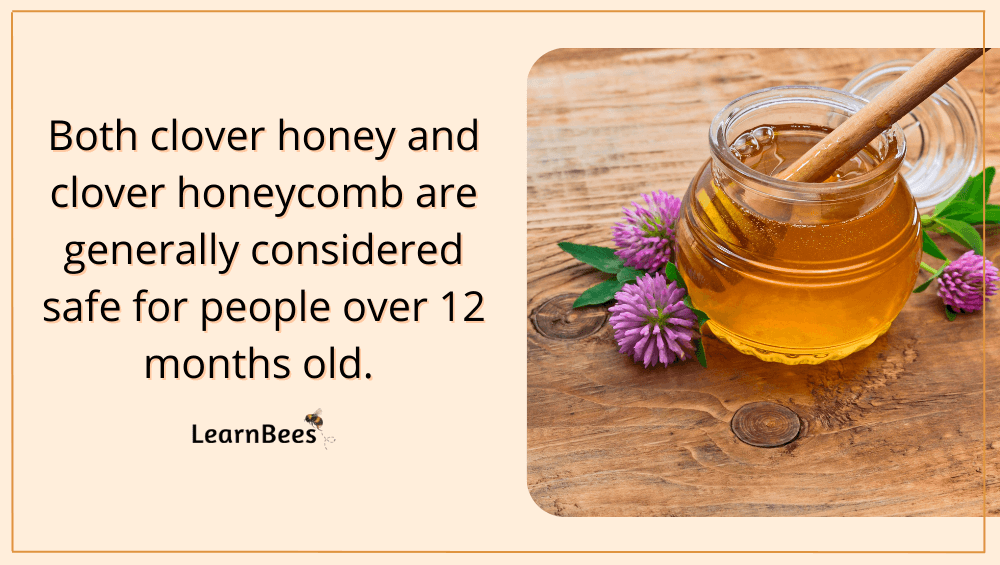
Honey is generally considered safe for most people over the age of one. Clover honey is a low-risk food that rarely causes adverse reactions.
If you’ve had an adverse reaction to honey in the past, it’s wise to check with your doctor before consuming clover honey.
With that in mind, there are two things to consider before eating honey in general. Be aware of the following side effects:
Risk 1: Clover Honey Should Not Be Given to Babies

Honey can contain spores of the bacteria Clostridium botulinum.(15)
This bacteria is especially harmful to babies under the age of one. It can lead to botulism poisoning, which results in life-threatening paralysis. Since a baby’s immune system is still developing, they’re at risk of contracting these spores.(16)
On the other hand, botulism is rare amongst older children and healthy adults. As we age, our gut develops enough to prevent the botulinum spores from growing.
The first sign of infant botulism is typically constipation. Your baby may also experience muscle weakness and trouble breathing and eating.
Risk 2: Diabetics Should Eat Clover Honey in Moderation

Some people say honey is better than table sugar for diabetics.
However, people with diabetes should be aware that both honey and sugar will affect blood sugar levels. Honey is also high in carbohydrates and calories like granulated sugar.
Pure honey does have a lower glycemic effect than white sugar, but it might be best to limit honey and other sugars in your diet.
FAQs on Clover Honey
- Is clover honey different than regular honey?
- When does clover bloom?
- What color is clover honey?
- What is clover honey good for?
- How is clover honey made?
- Is clover honey good for cough?
- What does clover honey taste like?
- Is clover honey healthy?
- Is manuka honey better than clover honey?
- Is clover honey filtered?
- What is the difference between orange blossom honey and clover honey?
Is clover honey different than regular honey?
People often ask, “What is clover honey vs. regular honey?”
Here’s the thing:
There’s no such thing as ‘regular’ honey. This is because there are over 400 varieties of honey, including wildflower honey, blueberry honey, and maple honey.
So the term ‘regular honey’ isn’t specific.
The flavor of honey comes from whichever flowers the bees pollinate. So when honeybees pollinate orange blossoms, it’ll result in honey with a hint of orange flavor.
All types of honey have a unique taste. Some are sweeter than others, while some have a more earthy and nutty undertone. The flavor of clover honey is sweet with a mild floral taste.
—> Go back to the FAQs on Clover Honey
More to Explore:
When does clover bloom?
Clover crops can be found throughout the United States, and they bloom primarily through the spring and summer.
For example, red clover can bloom in many different soil types throughout the spring and summer. Clover belongs to the genus Trifolium, consisting of about 300 species of clover plants that are members of the pea family.
Most temperate and subtropical regions of the world also have clovers.
There are many reasons to plant clover plants. They can be used as livestock feed, or they can be grown as a cover crop. Plus, honeybees and other pollinators love clover.
—> Go back to the FAQs on Clover Honey
More to Explore:
- The Top 3 Best Manuka Honey Brands
- Orange Blossom Honey: Uses, Benefits, & Risks
- Sourwood Honey: Uses, Benefits, & Risks
What color is clover honey?
Clover honey varies in color depending on the clover plant the bees pollinate. For example, some clover honey is light amber, while others may be white.
In general, clover honey tends to be a light color compared to other types of honey.
I find the darker the honey, the stronger the flavor profile. Lighter honey has a sweet, delicate flavor compared to dark honey. In contrast, darker honey is often less sweet with an earthy or nutty undertone.
For instance, buckwheat honey can be almost black with a strong molasses-like flavor. Whereas light clover honey has a mild floral taste and a nice amount of sweetness.
—> Go back to the FAQs on Clover Honey
More to Explore:
What is clover honey good for?
Clover honey has many uses. It pairs nicely with foods like muffins, toast, and bagels. It even makes nice salad dressings or glazes for ham and other meats. People also enjoy using clover honey as a sweetener for coffee or tea.
Clover honey comes with many health benefits. Here are a few benefits of clover honey:
- It works well for soothing coughs and sore throats. Studies have shown that clover honey can be more effective than some over-the-counter cough medicines.
- It’s rich in antioxidants. Honey has phenolic acids, which are known for their antioxidant properties. These properties can strengthen the central nervous system.
- It’s antibacterial and antiviral. Clover honey makes for a good wound dressing for burns and cuts. Studies have shown that honey can help speed up the healing process.
- It can help improve overall health. Honey has been shown to help lower blood pressure and improve cholesterol levels in some studies.
—> Go back to the FAQs on Clover Honey
More to Explore:
- The Brutally Honest Truth About Sour Honey
- Buckwheat Honey: Uses, Benefits, & Risks
- Can You Eat Honeycombs?
How is clover honey made?
People often ask if clover honey has ingredients that humans can replicate. The answer is that real clover honey is uniquely made by bees. That said, there is some artificial honey being introduced into the market.
But keep in mind:
The authentic clover honey is made by bees that collect the nectar of clover plants. The honey can vary in color, depending on the clover plant the bees have pollinated.
The process begins when worker bees collect nectar from clover flowers. They store the clover nectar in their honey crops and head back to the hive.
Once they’re back at the hive, they pass the nectar to other bees. These bees then add enzymes to the nectar, which breaks down the sugars.
After that, the bees fan their wings, which evaporates the water from the nectar. This process turns the nectar of the clover plants into honey.
Finally, the bees store the honey in honeycombs, where it will stay until the honeybees need it during the harsh winter months. Bees eat honey during the winter when there is no nectar available.
—> Go back to the FAQs on Clover Honey
More to Explore:
Is clover honey good for cough?
Yes, clover honey is known for its cough-suppressing qualities. In fact, honey has been used as a home remedy for centuries to help soothe coughs and sore throats.
Several studies have shown that honey can be more effective than some over-the-counter cough medicines.
Just make sure you’re buying quality honey that’s raw and unfiltered.
—> Go back to the FAQs on Clover Honey
More to Explore:
What does clover honey taste like? Does clover honey taste different?
Clover honey tastes mild and sweet with a floral undertone. Clover honey is sweeter than other types of honey, such as buckwheat honey. This is because different types of honey have various floral sources, resulting in unique tastes.
With that in mind, the flavor of clover honey can vary depending on the type of clover plant the bees have pollinated.
For example, some clover honey may be sweeter with stronger floral undertones. Other clover honeys may be less sweet with a more subtle floral taste.
In conclusion, clover honey is a delicious and great way to sweeten your food. It also has many benefits, such as being a good cough suppressant.
—> Go back to the FAQs on Clover Honey
More to Explore:
Is clover honey healthy?
Yes, clover honey is a natural sweetener with several health benefits. It’s rich in antioxidants and has antibacterial and antiviral properties. Clover honey also helps aid in overall health by lowering blood pressure and improving cholesterol levels.
The only caveat to clover honey is that people with diabetes should use it in moderation. Honey will raise blood sugar levels. However, the glycemic index for honey is lower than table sugar, but people with diabetes should still consume it in moderation.
—> Go back to the FAQs on Clover Honey
More to Explore:
Is manuka honey better than clover honey?
Both manuka honey and clover honey have unique benefits, and the flavors vary.
Manuka honey comes from New Zealand and has a strong, earthy taste. Some people love it, and others find it too strong. Clover honey has a milder, sweeter flavor with floral undertones.
As for health benefits?
You can’t go wrong with either.
Manuka honey is known for being antibacterial and healing wounds. It’s also effective in treating other conditions, such as sore throats, upper respiratory infections, and some skin conditions.
Clover honey also has antibacterial and antiviral properties. Additionally, it’s effective in soothing coughs and contains antioxidants that can help improve overall health.
Therefore, both manuka honey and clover honey have similar benefits. It’s hard to say which one is the best honey because it depends on the taste you prefer.
—> Go back to the FAQs on Clover Honey
More to Explore:
Is clover honey filtered?
It depends on which company manufactures the clover honey. Some companies process and filter their honey, while others don’t.
But honey quality matters.
So our suggestion is to avoid processed commercial honey. Processed honey from grocery stores often comes with added sugars. This dilutes the honey to the point where it’s no longer considered real honey.
If you’re looking for raw, unfiltered honey, you’ll want to check the label to ensure that’s what you’re getting. The best way to buy raw and natural honey is from a local beekeeper or farmers’ market.
—> Go back to the FAQs on Clover Honey
More to Explore:
What is the difference between orange blossom honey and clover honey?
The main difference between orange blossom honey and clover honey is the taste. Orange blossom honey will have a slight citrusy taste, whereas clover honey will have a floral taste.
Both honey types are rich in antioxidants and have antibacterial properties in terms of health benefits.
So, the main difference is taste. If you’re looking for a honey with a citrusy flavor, orange blossom honey is the way to go. If you prefer honey with a floral flavor, then clover honey is what you’re looking for.
